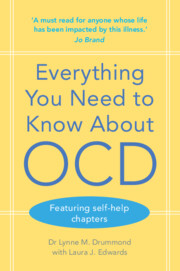Book contents
- Everything You Need to Know about OCD
- Reviews
- Everything You Need to Know about OCD
- Copyright page
- Contents
- Preface
- Acknowledgements
- 1 What Is OCD and Is It Really a Problem?
- 2 Who Gets OCD and How Would Anyone Know if They Had It?
- 3 Types and Presentation of OCD
- 4 Drug Treatment
- 5 Exposure and Response Prevention for OCD
- 6 Children and Adolescents with OCD
- 7 Old Treatments, Modern Developments, New Research, and Potential Treatments for the Future
- 8 Other Conditions Which Appear Similar to OCD
- 9 What Can Family and Carers Do to Help a Person with OCD?
- 10 What Can You Do to Help Cope with Your OCD?
- 11 General Principles of Treatment
- 12 How to Better Manage Your Symptoms Before and During Treatment
- 13 Overcoming Fears of Contamination
- 14 Fear of Harm to Self or Others Due to Failure to Act
- 15 Fear of Harm to Self or Others Due to Your Own Actions (or Thoughts)
- 16 Overcoming ‘Taboo’ Obsessive Thoughts
- 17 Loss of Something (Objects or Part of ‘Self’)
- 18 Overcoming Obsessive-Compulsive Slowness, Perfectionism and Symmetry
- 19 Overcoming Obsessive Ruminations (Sometimes Known as ‘Pure O’)
- 20 When the Treatment Doesn’t Go According to Plan or Even If It Does, What to Do Next
- Appendix
- Glossary
- Resources
- References
- Index
12 - How to Better Manage Your Symptoms Before and During Treatment
Published online by Cambridge University Press: 27 May 2022
- Everything You Need to Know about OCD
- Reviews
- Everything You Need to Know about OCD
- Copyright page
- Contents
- Preface
- Acknowledgements
- 1 What Is OCD and Is It Really a Problem?
- 2 Who Gets OCD and How Would Anyone Know if They Had It?
- 3 Types and Presentation of OCD
- 4 Drug Treatment
- 5 Exposure and Response Prevention for OCD
- 6 Children and Adolescents with OCD
- 7 Old Treatments, Modern Developments, New Research, and Potential Treatments for the Future
- 8 Other Conditions Which Appear Similar to OCD
- 9 What Can Family and Carers Do to Help a Person with OCD?
- 10 What Can You Do to Help Cope with Your OCD?
- 11 General Principles of Treatment
- 12 How to Better Manage Your Symptoms Before and During Treatment
- 13 Overcoming Fears of Contamination
- 14 Fear of Harm to Self or Others Due to Failure to Act
- 15 Fear of Harm to Self or Others Due to Your Own Actions (or Thoughts)
- 16 Overcoming ‘Taboo’ Obsessive Thoughts
- 17 Loss of Something (Objects or Part of ‘Self’)
- 18 Overcoming Obsessive-Compulsive Slowness, Perfectionism and Symmetry
- 19 Overcoming Obsessive Ruminations (Sometimes Known as ‘Pure O’)
- 20 When the Treatment Doesn’t Go According to Plan or Even If It Does, What to Do Next
- Appendix
- Glossary
- Resources
- References
- Index
Summary
Many people with OCD have neglected themselves for a considerable amount of time. This can have an adverse effect on your physical as well as mental health. In addition, some people try to overcome OCD by using substances, or restricting their diet or fluid intake, as an attempt to control their OCD or because ‘the OCD tells them to’ do certain things. By nature, many people with OCD tend to have an ‘all or nothing’ approach to life and this in itself can lead to periods of feast or famine which can have an effect on general health and wellbeing. It can therefore be helpful to try to improve your general physical health either before or during treatment.
- Type
- Chapter
- Information
- Everything You Need to Know About OCD , pp. 191 - 204Publisher: Cambridge University PressPrint publication year: 2022

